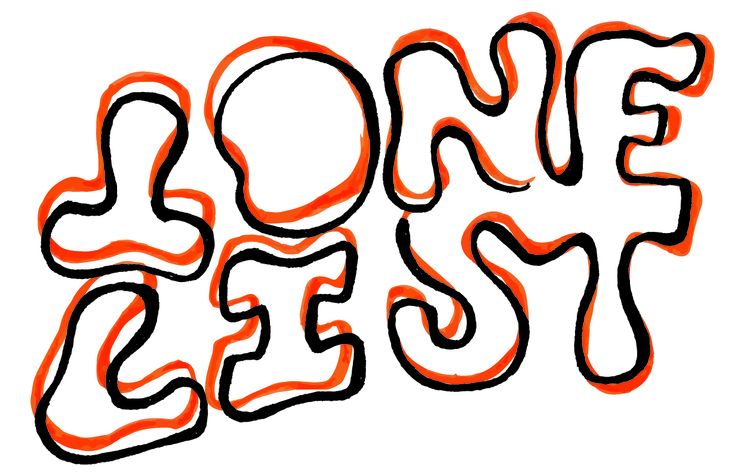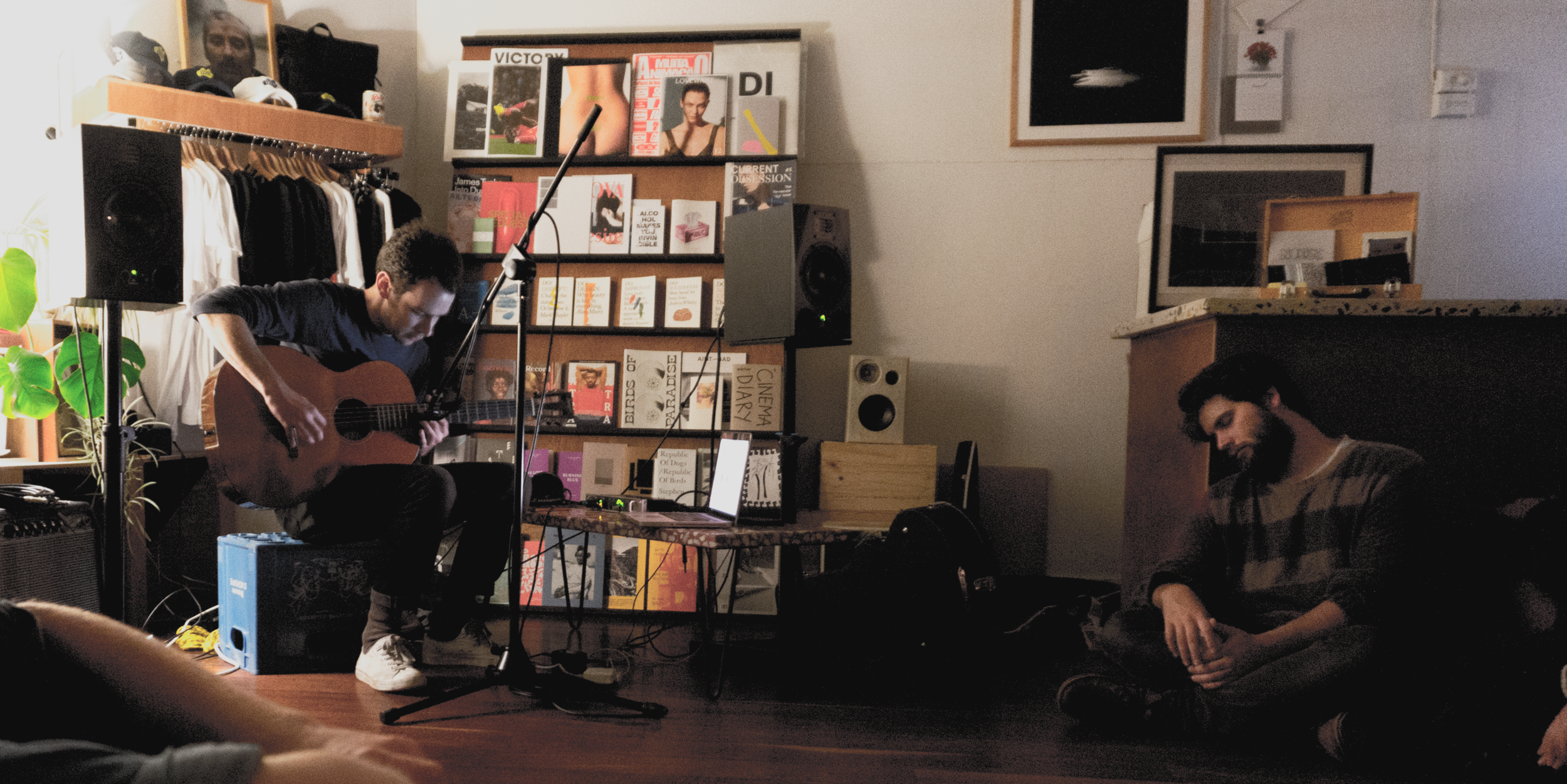#47 - 7AM
#46 - Make It Up Club / Liquid Architecture
Photos courtesy of Keelan O'Hehir (Photographer), Make It Up Club & Liquid Architecture.
TLQ#7 - Lindsay Vickery
in TLQ
The same questions, asked to different improvisers in Perth. Credit for the idea, and some of the questions, goes to the amazing Addlimb archive.
Photo taken at the Perth Institute of Contemporary Art in 1989 by John Austen.
What led you to improvised music?
I think the first improv music I heard was Ornette Coleman’s Science Fiction. I must have been 14 or 15 because I named my first piece after the jungle is a skyscraper which is on that album. I think I found the album in a remainder bin, but I can’t remember where I’d heard of Ornette before that. Science Fiction has a range of different sorts of music on it some proper free jazz, some more “trad” sort of Coleman tunes and two “songs” with slow/fast textures like “Lonely Woman”. Around then I developed a vague ideal of being able to play anything I could imagine or hear. It came out of an interest in Surrealism. I actually contemplated dropping out - to do that, but it was a different time. In early University there were these students Peter Hadley and Lorentz Lossius who were pretty inspiring. I think probably they directed me to the Scratch Orchestra and that world. We (or I or they I really can’t remember) formed an improv ensemble and that eventually led to hooking up with Tos Mahoney’s Fremantle Music Series and what was eventually Evos/Tura.
What instrument or equipment do you use to improvise, and what is your relationship with this equipment?
Clarinets and saxophones, either by themselves, using “no-input” feedback or electronic processing. Not computer alone. Not voice alone. I usually setup things to work unpredictability so there is some engagement with performing in a context or environment.
What keeps you improvising? What do you think makes this music important, either personally, socially, politically, etc.
The vague notion of making things. Working with others. Improv as an alternative way of being/abstraction/nonverbally communicating or interacting. I think it flows back into the normal “non-improvising world” too in terms of awareness of sound. I spent a lot of time in the last few years listening to field recordings and now I find I’m much more conscious of the “sonic environment”, particularly other animals etc.
What are your feelings on the relationship between planning and spontaneity in improvisation?
I'm not dogmatic. I go as far as fully notating improvisations and making them into chamber music. I think structures, particularly unpredictable ones, can drive spontaneity, but I’m also comfortable with the no premeditation approach. I’m definitely not one of those against even recording improvisations – its just a slightly different thing and they are both interesting/useful.
How do you evaluate or reflect upon improvisations you’ve played? How does the evaluation of a recording differ from the evaluation of a performance?
I think participating in improvisation and listening are totally different, when I listen to a recording it is very much as an audience member - the total context almost always feels and sounds different from the listening that happens when you’re participating - especially in regard to time. Time generally feels much slower or even sort of suspended in performance.
Do you think there is room for discursive (as opposed to non-discursive) thought in improvisation? Can discursive thoughts whilst playing be productive rather than distracting, and if so, do you have an idea as to when this might be the case?
If I understand the question - I suppose I myself prefer the "old school" idea of being “in the moment”.
Can you name three albums/pieces/experiences that inspired you to start improvising, and three that are currently inspiring you?
Well I already mentioned Science Fiction. At different times Zorn’s Cobra, Set Fire to Flames’ Telegraphs In Negative, Polwechsel 2, Evan Parker Saxophone Solos, Agostino di Scipio Texture/Residue, Lachenmann Pression.
What do you feel should happen next to see further growth in exploratory music practice in Western Australia?
A lot is happening in the last few years. There’s been a huge growth in numbers in the WAAPA Composition and Music Technology course, a proliferation of gigs and kinds and location of gigs and labels such as NoizeMaschin!!, Tone List, Outcome Unknown, Second Iteration, Automatic Sound Series etc. happening in the Hills and to the South and North rather than just in the City and Fremantle. I read someone who suggested that improv and noise are the new folk music – that’s an interesting idea I think. I’m interested to try and spread at least some of the work people are making beyond the Perth metropolitan area. There has recently been a big increase in the number of students coming from regional areas. I would like to see how some of this work is received there too. We’re doing a pilot project to put purpose made local exploratory music in shops featuring locally made and sourced products. To change that annoying thing when you go into an “Australian made” sort of shop and they are playing something that might as well be American radio. I think documentation – creating a history is really important and that's why its great that the WA New Music Archive is around now too.
lindsayvickery.com
#45 - Inland 17.B: A Life of Afterwords Begins
#44
#43 - Tchake at Residence #3 (excerpt)
#42 - eszetts at Automatic Sound Series
TLQ#6 - Eduardo Cossio
in TLQ, interviews
The same questions, asked to different improvisers in Perth. Credit for the idea, and some of the questions, goes to the amazing Addlimb archive.
Photos by Neil Francis & Laura Strøbech respectively.
1. What led you to improvised music?
A difficult question! I feel like I have been improvising with sounds and music since I’m a little kid.
2. What instrument or equipment do you use to improvise, and what is your relationship with this equipment?
I play guitar during shows and use a metal slide, an ebow or attach small objects on the strings. The guitar switches and short strings around the tail are also great to play with. I am interested in highlighting the physicality of the instrument.
3. What keeps you improvising? What do you think makes this music important, either personally, socially, politically, etc.
I enjoy the process of it, making decisions and then playing with their limits and possibilities. Improvisation to me is all embracing: the serious, the silly, the physical, the spontaneous, the environment, etc., everything is at the same level and accepted in non-judgemental ways. It is a very immediate way of making music and establishing connections with people.
4. What are your feelings on the relationship between planning and spontaneity in improvisation?
Many times I will make a decision and its course is still unknown. I think it is very difficult to pull them apart, perhaps planning and spontaneity need each other.
5. How do you evaluate or reflect upon improvisations you’ve played? How does the evaluation of a recording differ from the evaluation of a performance?
After the set is done it is very confronting being ‘on stage’ in front of people because you enter a weird zone in your mind. It is as if all life has been condensed into those 20 or so minutes. Yet, when I listen back to recordings I can spot my ‘bag of tricks’ or wonder if I should have slowed down at times… but that’s the composer’s mind asking questions. Failures are interesting too.
6. Do you think there is room for discursive (as opposed to non-discursive) thought in improvisation? Can discursive thoughts whilst playing be productive rather than distracting, and if so, do you have an idea as to when this might be the case?
My attention is always shifting. Me and the people I play with are trying to create a sound spectrum while accepting the unpredictable. I don’t think I can disentangle a process of this nature!
7. Can you name three albums/pieces/experiences that inspired you to start improvising, and three that are currently inspiring you?
Discovering the music and ideas of Pauline Oliveros, John Cage and Edgar Varese broadened the meaning of music for me and this led me to improvise the way I do now.
Currently I am inspired by the community-minded work of Jim Denley; local artist Furchick, someone with an amazing creativity and listening skills; and my pals in the local experimental scene, the thought of collaborating with them is what really keeps me going.
8. What do you feel should happen next to see further growth in exploratory music practice in Western Australia?
I like the idea of music-making as a daily activity, away from institutions or venues. Non-conventional places can be used for this, the idea is to make music something that is relevant, something that everybody can tap into, even if you have never sang or played an instrument before. We tend to live strict lives where every space has a specific function, I believe outdoor performances can help subvert this codified lifestyle. To do this, musicians should start thinking of themselves as community leaders.


![LA2017_LAxMIUC 220817-Wang[TWN] (Keelan O'Hehir) -49.jpg](https://images.squarespace-cdn.com/content/v1/57183e8286db436a3793a7cf/1505658497350-MCHZ7J619PM6OTNWNSD7/LA2017_LAxMIUC+220817-Wang%5BTWN%5D+%28Keelan+O%27Hehir%29+-49.jpg)
![LA2017_LAxMIUC 220817-Wang[TWN] (Keelan O'Hehir) -32.jpg](https://images.squarespace-cdn.com/content/v1/57183e8286db436a3793a7cf/1505657886326-ONAADS0LRQWSJU3PM9GS/LA2017_LAxMIUC+220817-Wang%5BTWN%5D+%28Keelan+O%27Hehir%29+-32.jpg)
![LA2017_LAxMIUC 220817-Wang[TWN] (Keelan O'Hehir) -48.jpg](https://images.squarespace-cdn.com/content/v1/57183e8286db436a3793a7cf/1505658331899-L64Y8Y32SB2MI27L9FRP/LA2017_LAxMIUC+220817-Wang%5BTWN%5D+%28Keelan+O%27Hehir%29+-48.jpg)
![LA2017_LAxMIUC 220817-Wang[TWN] (Keelan O'Hehir) -43.jpg](https://images.squarespace-cdn.com/content/v1/57183e8286db436a3793a7cf/1505657992170-7RRA8D6WC2HCD2IHRLLF/LA2017_LAxMIUC+220817-Wang%5BTWN%5D+%28Keelan+O%27Hehir%29+-43.jpg)
![LA2017_LAxMIUC 220817-Wang[TWN] (Keelan O'Hehir) -53.jpg](https://images.squarespace-cdn.com/content/v1/57183e8286db436a3793a7cf/1505659435692-8EJZ0IUS9KYAZTUCQ4JD/LA2017_LAxMIUC+220817-Wang%5BTWN%5D+%28Keelan+O%27Hehir%29+-53.jpg)











